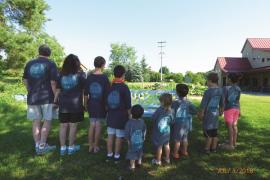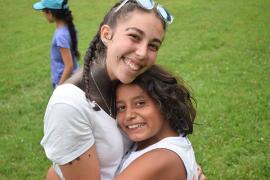In late July 2014, I sat on my bed, alone for the first time all day, reeking of garbage and motor oil, and listening to rain pummel the tin roof. Satisfied I’d done my duties for the night, I had started to unzip my raincoat when an angry knock sounded on my door.
I groaned, staggered to my feet, and opened the door. My director stood on the doorstep, clipboard in hand, headlamp casting shadows around me. Certain I had messed something up, as I had done too often in this first summer as a program assistant, I presented the most innocent face I could manage.
I probably just looked tired. The last weeks of camp were upon us, and some counselors were beginning to look like zombies too. I felt their pain and remembered it well from my five years as a counselor. They were losing sleep, getting frustrated and bored with the monotony that can creep into camp life. In other words, they were suffering from burnout — that most feared affliction camp professionals are always trying to cure.
“Come with me,” my director said. “I need your help.”
I zipped up my raincoat, clicked on my headlamp, and trudged after her into an abyss of rain and shadows.
When we made it to the dining hall, it was clear what this was all about. Way down on the lower deck, pelted with rain and obscuring more than one fire exit, sat a sad-looking table. Some counselors and campers must have snuck out earlier that night and moved someone’s table outside. To add insult to injury, they had flipped the table upside down. A classic late-summer prank.
“Ah,” I said. I pictured a crew of sleepy ten-year-olds having to fix this in front of a hundred people before they could eat breakfast.
“Yep,” she added.
For a moment we stared down at the table, our headlamps turning the water blinding white. Finally, we lifted and hauled the table all the way back to its proper place.
The next morning, the pranksters were baffled. That was a sight to see: bewildered campers and counselors staring at a table that shouldn’t be there. Meanwhile their clueless victims munched on pancakes, excited for a new day at camp.
As I pondered this moment in the following weeks, I thought about my years as a counselor. Had I not dealt with burnout in similar ways at first? The desire to shake things up at the end of the summer is always tempting. And this feeling isn’t unique to camp counselors. It’s the same lure performers feel on the last night of a long-running show to sneak inside jokes into the script, change a line, or break character on purpose.
But the best performers don’t make it to Broadway or the NBA by messing up. While honest mistakes are all part of learning, camp requires focus and consistency. The best counselors I know — like the best performers and athletes — don’t give in to temptations that merely distract them from their mission: taking care of campers and enriching their lives.
That doesn’t mean that camp can’t be exciting. No one should have to live the same day over and over for months. But rather than seeking distraction, find ways to pump life and excitement into your work that are deeply tied to your camp’s mission.
In other words, instead of seeking pranks, the best counselors focus on projects.
When we look at what the bored counselors chose to do in my example, the difference between these two approaches becomes clear. By jumping from boredom to action, they didn’t consider how their prank would impact campers, potentially causing embarrassment and a diminished sense of security. The interconnectedness of life and individuals is a pillar of our camp’s mission, and helping campers feel comfortable and safe is a priority in all strong camp communities. Distraction without thinking of your camp’s mission — that’s a prank.
A project is different. When we start to feel that end-of-summer stagnation, that urge to invent entertainment and novelty, we don’t jump on the first activity that comes to mind. Instead, we start from our camp’s mission and work backwards. We start with what we value and then try to find an interesting way to promote those values.
A project boils down to is this: Find one piece of your job and get really good at it. Think of it as perfecting your free throw or a tricky dance move. The word “project” might sound lifeless, but what it implies is being purposeful and creating a repeatable process.
Follow These Steps
Here’s how that works at camp. The first step is to understand your camp’s mission — what your community has chosen to value and to pursue in all aspects of camp life.
The second step is to pay attention. Look for moments that don’t feel right to you, that don’t represent what your camp is about. These can be big moments like repeated bullying. Or they can be small moments that might slip between the cracks, like a child sitting alone each day. When you see moments like these, write them down. A notebook will help you focus and identify trends.
Once you’ve found something that sparks your interest, think about how you might address it. Here’s your chance for creativity. Frustrated with misbehavior during rest hour? What if you tried rest hour outside instead? Is your group in disarray? How about waddling like penguins between activities?
The next step is the most important. It requires some humility, but it’s a skill that will earn you a surprising amount of respect from your peers and supervisors: Ask for help.
People feel good when you ask them for advice, and they’ll think highly of you for seeking it. Engaging peers and supervisors about what you’ve noticed — your project — will help them notice and appreciate it. When I ask people for advice, they often approach me later to ask how it’s going. I feel supported, but I also feel accountable.
And that’s the final step: Make yourself accountable by setting specific goals and evaluating your progress. I usually talk this through with my boss when I ask for advice. For example, if I’m trying to solve a behavior issue in my cabin, we always talk about what I could reasonably accomplish by when, and what we’ll do if that doesn’t work out. (Try having this conversation about waddling like penguins. Only at summer camp.)
I find this process gives me a profound sense of purpose. When it works, I’m solving problems with the help of my friends, and I’m earning the respect of my community. Most of all, it reminds me that I’m at camp to build skills and change lives.
But here’s a secret: You don’t have to feel stagnant to work on this kind of project. When I’m at my best, I’m always approaching problems this way, even from the very first moments of camp. I find it puts my heart in the right place from the beginning — focused on campers.
Avery McGaha is a journalist and environmental educator. He spent the best summers of his life at Green River Preserve — washing dishes, playing with kids in the rain, and teaching them about ants.


